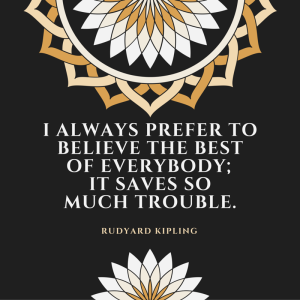As an empathetic and highly sensitive teenager and young adult, I experienced a lot of hurt in my interactions with others. I can’t recall the number of times I’ve retreated into washroom stalls or emergency exit stairwells in order to compose myself, after harsh interactions left me uncontrollably crying.
Now, I’m not talking about specific bullying (although I’ve known my own share of that), just the more general inconsiderate or abrasive comments one can come across on any given day. All unkind words were felt as many deep cuts in my soul. What did I do to deserve this pain?
I spent a lot of time rehashing past or potential conversations. Why were people so mean to me?
Does that sound familiar to anyone else?
Even if you don’t identify with being particularly sensitive, do you ever have those moments when you feel like everyone else is an adversary?
It’s easy to go through life thinking that the world is out to get you.
Yes, that’s what I said: it’s easy to go through life thinking that countless others are doing things specifically against you.
Wait, what? How can I say it’s easy when it obviously feels horrible?
What I mean is that’s an easy way out. It’s also pretty cheap.
It allows you not to take any responsibility for the things that are happening to you, because they’re obviously out of your control. The world’s out to get you, remember?
They don’t want you to get ahead at work!
They don’t understand how it is to be single!
They clearly have a chip on their shoulder because why else would they treat you this way?!
They don’t have to juggle work and family!
It’s easy for them to…
Ok. Stop. Seriously.
Who exactly is this they you keep talking about?
Are you actually willing to accept that you are not completely and utterly in charge of your own life because of a mysterious they?
No? I didn’t think so!
There’s something deeply defeatist in this way of seeing the world, isn’t there? I find that it breeds cynicism, disingenuousness and apathy. The energy that we’re putting out is that we can’t change, others can’t change, and situations are just as they are, no discussion or reframing allowed.
What if we were to choose to take another path?
Enter this transformative, yet simple way:
Giving Benefit of the Doubt
You may think that’s it’s easier said than done. I beg to differ. It’s more about practice than anything else. But before we go further, I think we need to take a step back.

We don’t know what’s going on in other people’s life.
I mean this very seriously: even when we believe we know, we don’t. We may be armed with the best of intentions, but we don’t know a thing. How arrogant is it to think we’ve got others figured out? And furthermore, isn’t it incredibly self-centered to think that whatever others are doing has anything to do with us?
Yet, we go about life assuming how people will react to situations, how they’ll respond to conversations, effectively deciding in their place, and then acting according to what we think they will do or say.
How much time do we spend imagining conversations with people, because we’re just so sure of exactly how they’re going to react, what they’re going to say, which arguments they’re going to use, etc.?
Not giving others the benefit of the doubt denies them their autonomy. We have to give others the opportunity to surprise us. Wouldn’t we want others to allow us our own reactions?
GIVING BENEFIT OF THE DOUBT—WHAT DOES IT MEAN?
Giving others the benefit of the doubt—i.e. consciously choosing not to assign meaning to interactions—is certainly an acquired skill, especially after a lifetime spent making assumptions. That said, it has the potential to free up a surprising amount of mental an emotional energy.
Once you start doing it consistently, you can definitely measure how liberating it is to simply let things go. How do we do it? It’s actually not that complicated; here are three straightforward steps:
- When someone says or does something that upsets you, realize that it’s extremely unlikely that it was specifically meant to affect you.
- Assume the best of everyone at any time. Not only will it help you cultivate a generally more positive outlook, but it can give others permission to show up at their best.
- Let it go. (I am so very tempted to break into song right now, but I won’t. It’s in your head now, isn’t it? You’re welcome.)
Basically, you need to stop trying to decide what motivates others, and how they will react. That’s not your responsibility. Your responsibility is solely what you, yourself, bring to the table. Let the others do their own thing.
When others assume the worst of us, it hurts. We tend to either lash out or close down, sometimes both. How can we possibly expect others to react positively when that’s the energy that we project?
Even when things don’t go the way we’d like them to, it’s useful to let go. Holding grudges only takes away from our own energy. Things are going great? Awesome! Things don’t go as we’d like? Acknowledge it and move on!
Doesn’t mean to look at the world with rainbow-coloured glasses, but simply to not attach ourselves to things that don’t “belong” to us. This may feel unnatural at first, as we are so used to staying attached to our judgments.
As Thích Nhất Hanh says:
People have a hard time letting go of their suffering.
Out of a fear of the unknown, they prefer suffering that is familiar.
We can be so pent up in our old patterns that doing things differently may seem impossible, but by giving benefit of the doubt in a more systematic matter, we make room in our life for more equanimity, for more ease.
And I don’t know about you, but if you give me a key to more ease? I’ll take it!
Want to get really personal? Then make sure you’ve joined my Special Crew! This is where some of my very best stuff gets sent out, including insight-rich mindset topics, insiders-only recipes, free workouts and much more! Add yourself here to get in!

